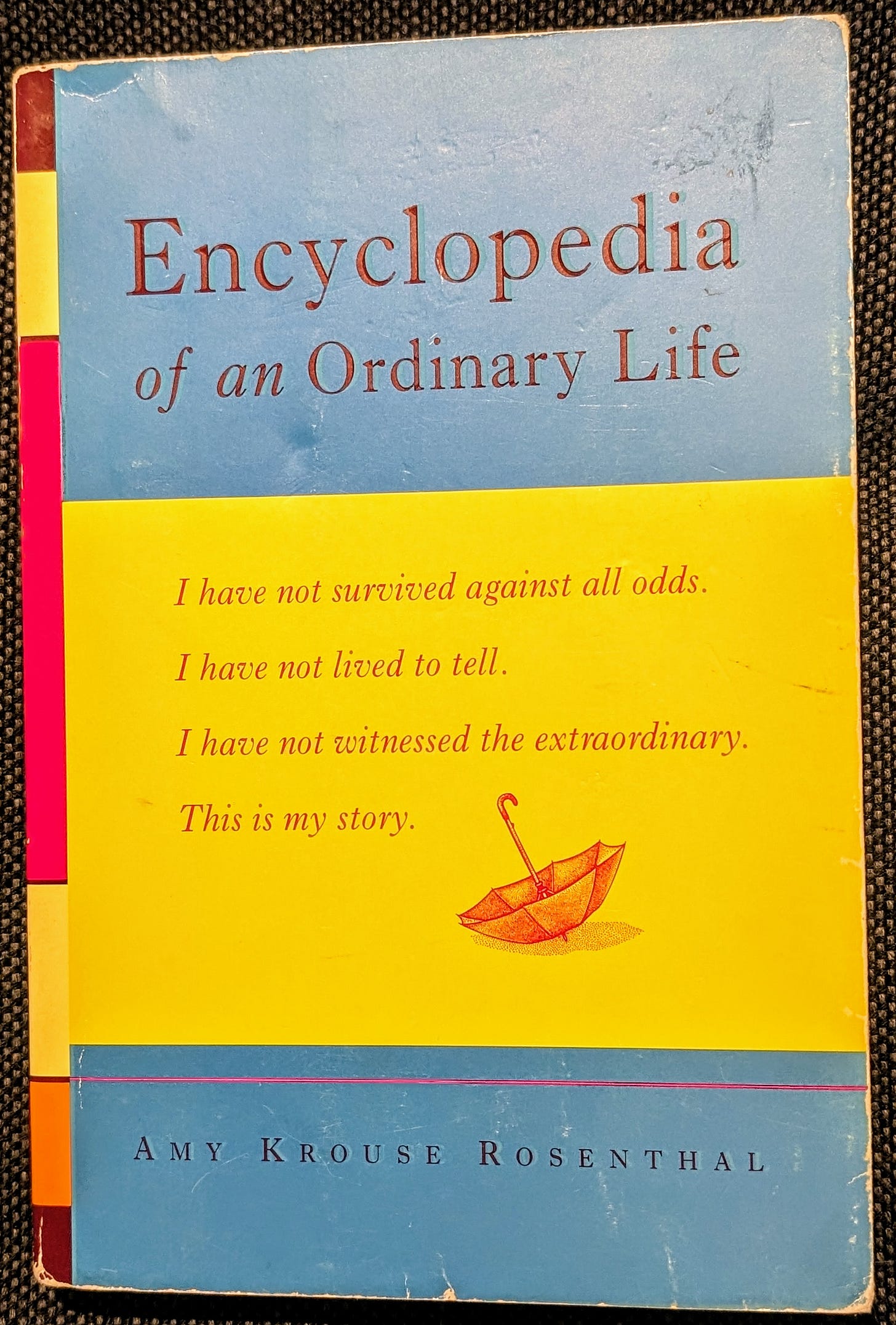Welcome to part 2 »»» Read Part 1 here «««
As I mentioned the other day, I had been working my way through The Anthropocene Reviewed during the twilight of the pandemic. Every chapter was fun, impactful, or both.
From Morning Sun Till Night
As Penguin Random House puts it, in the book John Green “reviews different facets of the human-centered planet on a five-star scale — from the QWERTY keyboard and sunsets to Canada geese and Penguins of Madagascar.”
It’s basically how my brain processes the world but with fewer jokes and more wistfulness.
As I said in The Bloggysey, Green summed up a core belief of mine:
“By paying extremely close attention to almost anything, I think we can learn about the universe and our place in it.”
Which brings us back to "Auld Lang Syne.
It’s the song you hear on New Years Eve or maybe in a place of saying goodbye to something, sometime, or someone. It famously begins with the line, “Should Old Acquaintance be forgot…”
Originally a Scottish poem, the lines became an all-time earworm around the globe. Doomed soldiers have sung it across battlefields. George Bailey and the revelers of Bedford Falls sing it as Clarence gets his wings in It’s A Wonderful Life. Performers even sang it in Mandarin Chinese at the closing ceremony of the 2022 Winter Olympics in Beijing.
Green considers the old tune and reminisces about his friend Amy.
Amy Was Here
Amy Krouse Rosenthal was an author, speaker, radio show host and more. I didn’t know it until reading the Auld Lang Syne chapter, but she also wrote my favorite “encyclopedia” with her book Encyclopedia of an Ordinary Life: A Memoir.
Her inventive format is perfect for the insightful, often hilarious, staccato bursts of observation that define her style. It’s a memoir, really, but formatted encyclopedia style.
Whether describing folding chairs (F) or thankfulness (T), Amy invites us to consider the fullness of every, ordinary day. As you read her brilliant bestseller, you realize how specificity does indeed reveal universal truths.
Even the obscure quirks of Generation X, Y, and Z hold the potential to reveal secrets as old as humanity. Truth can be found in the minutiae of life, consistent as the moonrise.
One of the fascinating things about being a memoir and personal essay writer is how you constantly document your worldview. As you age and grow and learn, you get to find out which beliefs proved to be truer than you knew, and which were unmitigated bullshit (B).
Encyclopedic blurbs are some of the best ways to transmit truthful trivialities — those small, precise details of something. And the picture is most clear when those blurbs capture the beats and breaths of a life.
I paused when I found a time where the beats of Amy’s life and my own intersected. Encyclopedia of an Ordinary Life came out on December 6, 2005. She was 40. It was my 28th birthday.
A week later I was sitting in the office of a college dean responsible for staffing history and political science courses. My wannabe Indiana Jones crusade had begun.
I love dated facts for how they take us back like that. Reflections on an afterschool scavenger hunt bleed into undergrad memories meandering through my mind like students making their way through musty library stacks. Then all at once I’m back on a campus, now as the teacher standing in front of fresh faces in their own pursuit of knowledge.
These days, those towering, library stacks continue to slip into obscurity along with the thick-bound volumes they held for so many years. But even as the digital revolution washes away the physical landscape of generations gone by, there’s still a place for a paperback full of one woman’s life and the multitudes it contains.
So, I love that Amy gave us her Encyclopedia of an Ordinary Life and am grateful that John helps keep her memory alive.
Sadly, his tribute was elegiac. Amy lost her battle with cancer in 2017, when I had just reached the age of her publishing triumph. I learned of her far too late.
And yet…
Isn’t that the magic of creativity? Something stirs then something forms. And sometimes, the effect is lasting, maybe even timeless. A gifted creator speaks to us still, even from the great beyond.
Near the end of her Encyclopedia, Amy wrote what remains one of the most beautiful pages in any book. Filed under “Y” for “You,” she challenges us to remember that her life, any life, is intense and full. The mundane is beautiful. Every day is significant. And doesn’t that make the ordinary anything but?
“I was here, you see,” she declares, almost defiantly.
Her words hit different now, yet she didn’t know her ultimate fate when she first wrote them.
You should read her book sometime.
An Inch Of Your Life
There’s just something human about asserting our existence. We want to be remembered because we want to matter. And in the future past, we want our life to have mattered.
Because old acquaintances should not be forgot and never brought to mind.
Memories are the only ammo we get against the undefeated march of time. So we leave signs and snippets along the way, no matter how trivial.
Our days are only so many suds on the roof after all.
But we get to make at least a few ripples along the way.
The Shawshank Redemption movie came out 30 years ago. (Speaking of that blasted march of time). Since 2008, regular IMDb voters have named it #1 on the all time list.
The popularity of Shawshank persists, in part, because we’re drawn to tales about the significance of each individual’s life. We’re wary of hope but desperate for personal transformation, and we recognize our power to impact others.
Andy, Red, and the warden of Shawshank are so iconic we often miss the titular promise that it’s first and foremost a story about Redemption.
Of all the movie soundtracks I’m obsessed with, Thomas Newman’s score for Shawshank is an all-time favorite. When I play those familiar notes and glance at the song list, I’m always struck most by two track titles.
Track #7: Brooks Was Here
Track #20: So Was Red
If you haven’t seen the film, go now!
If you have seen the film, you know the poignancy of those words, etched where two roads diverged in a carved wood. When Red makes his redeeming choice, we see a universal truth: Individuals have the capacity to learn, grow, and change, even in the most challenging situations.
Alternate paths can be found.
It’s easy to feel small and insignificant and forgettable. Even more so in the face of too many global crises. Our days are only so many suds on the roof after all. But we get to make at least a few ripples along the way.
Writing is my favorite way to make ripples. What’s yours?
I don’t know where you are mentally as you read this, but I’m willing to bet you’re feeling the weight of some heavy thoughts and choices. We become confined in so many ways, imprisoned by failing relationships, careers, bodies. It feels dangerous to believe that life’s pillars can still be the best things.
If times are hard, remember you can flip the script. You can change some thing in some way.
At least I want that to be true. Need that to be true. Don’t you? So I sit and write little ripples and am reborn.
I hope you’ve found your thing. Use it. Salvation lies within. Grind it like a rock hammer worn down to the nub.
Make a splash. And that right soon.
Because Amy was here.
So am I.
And so are you.






